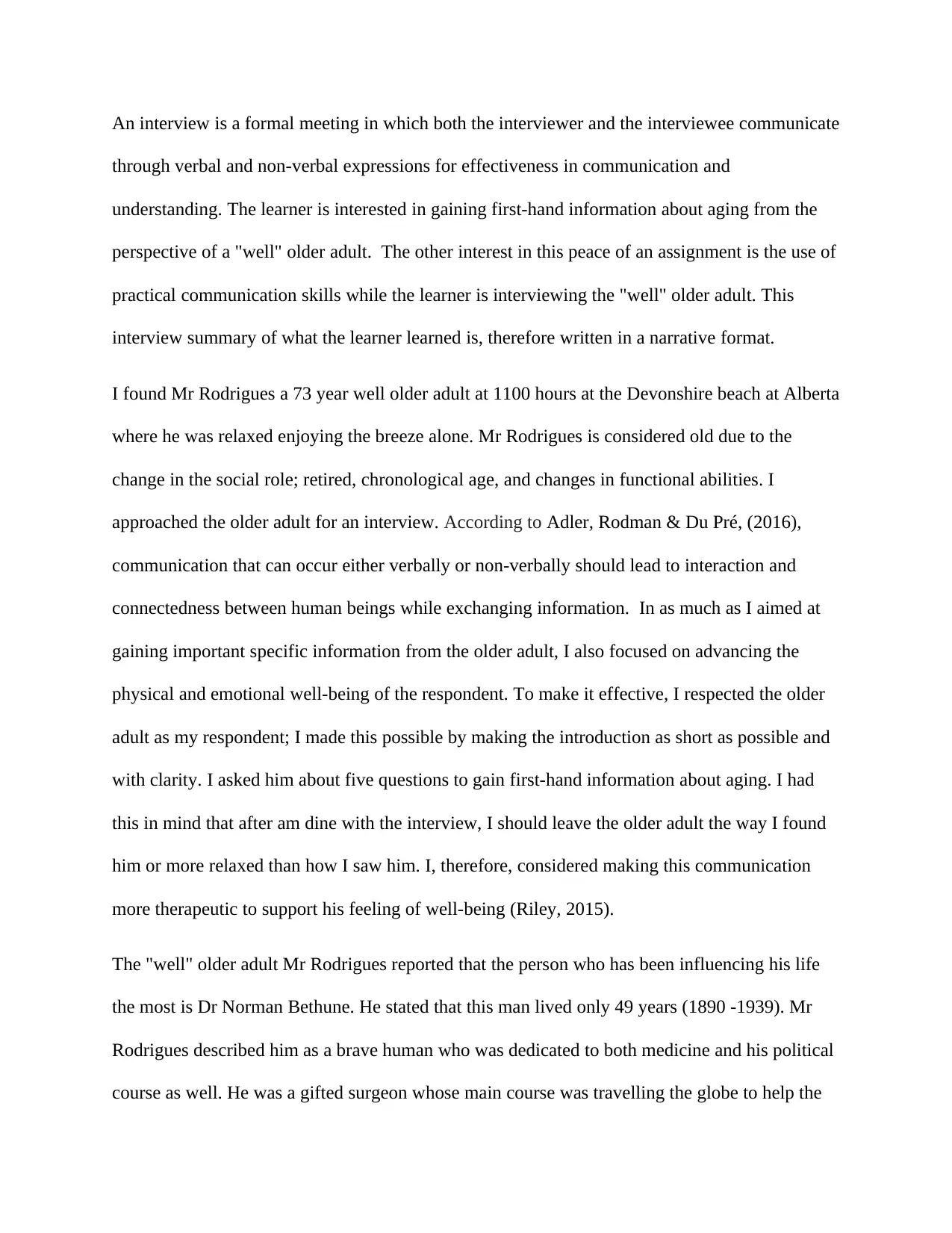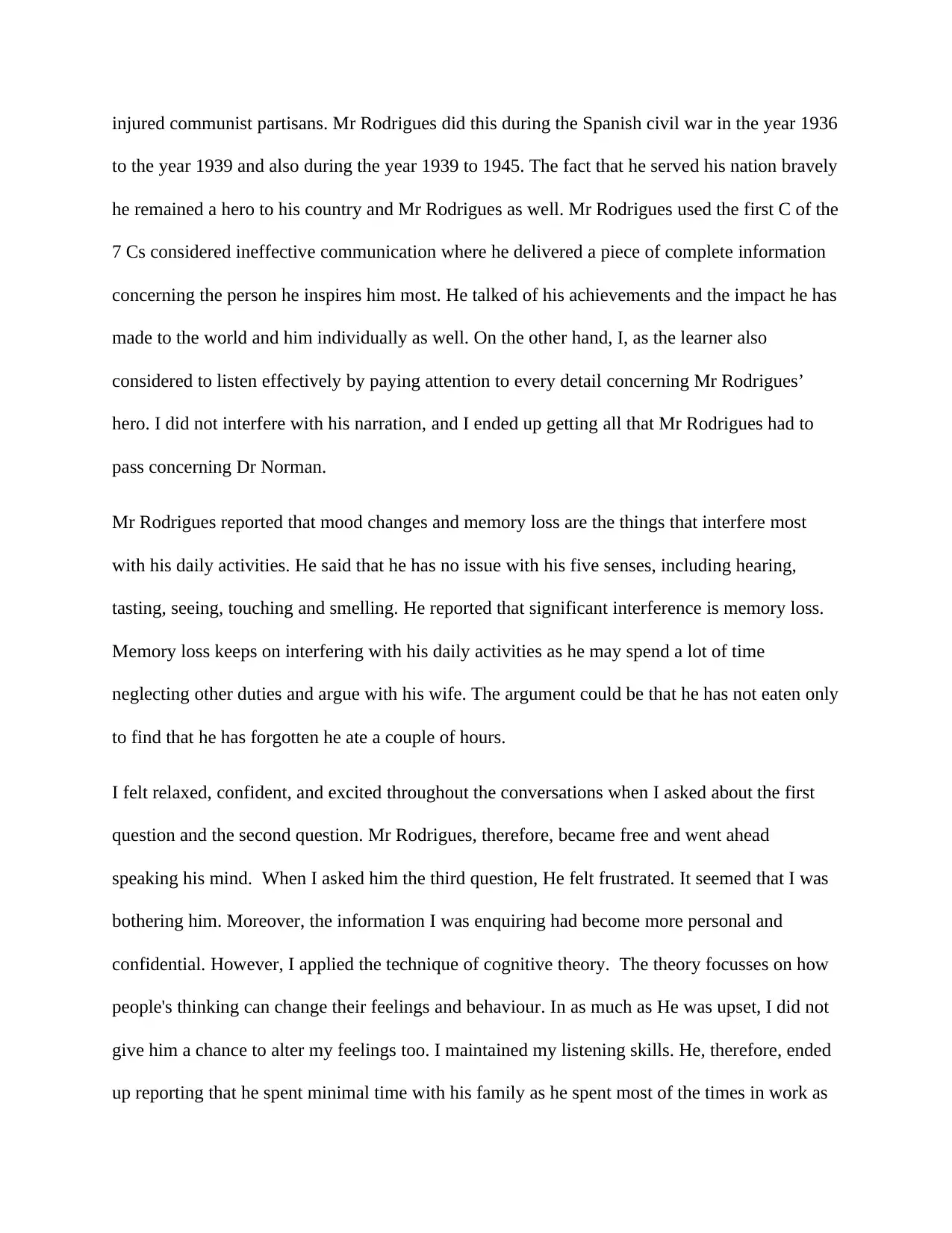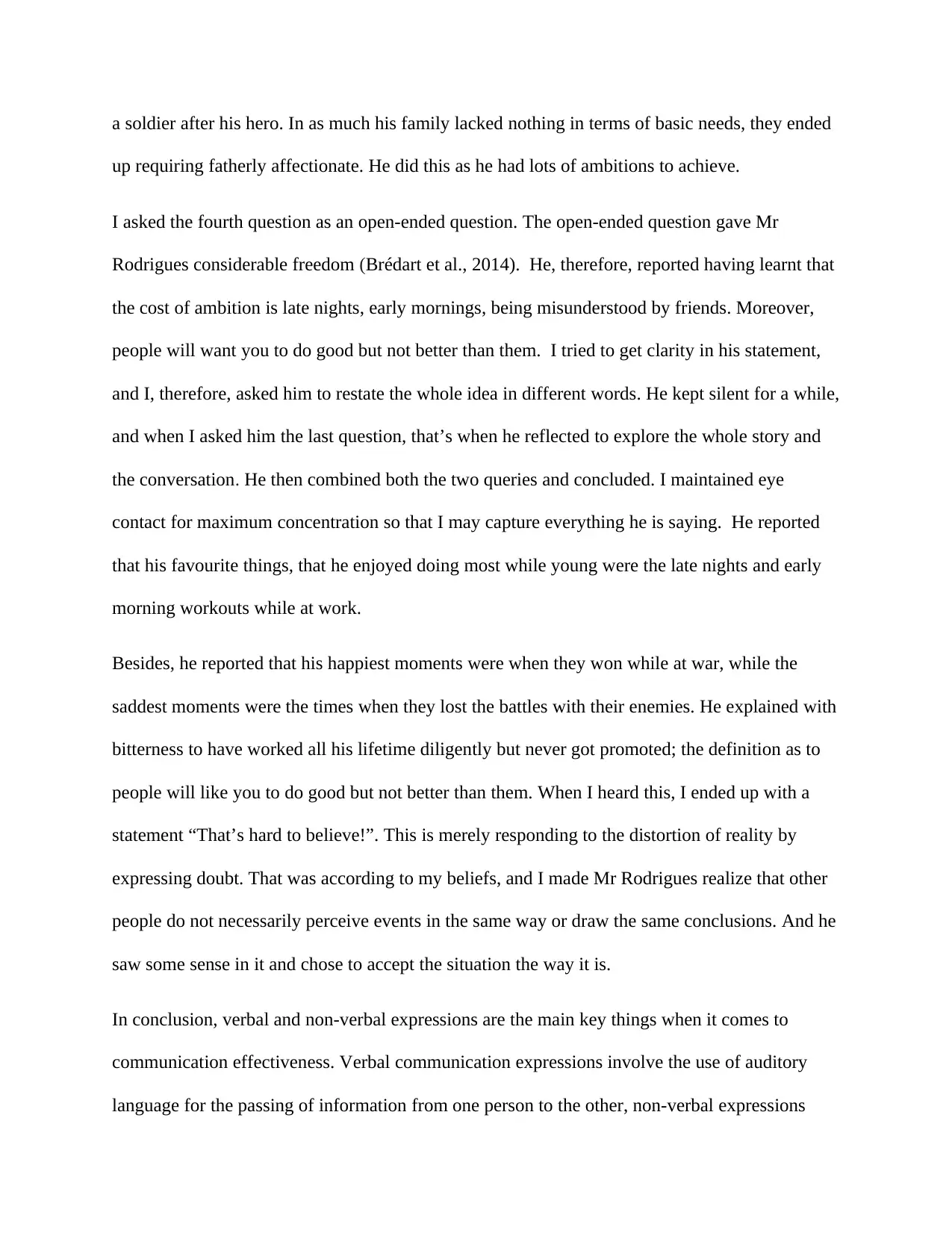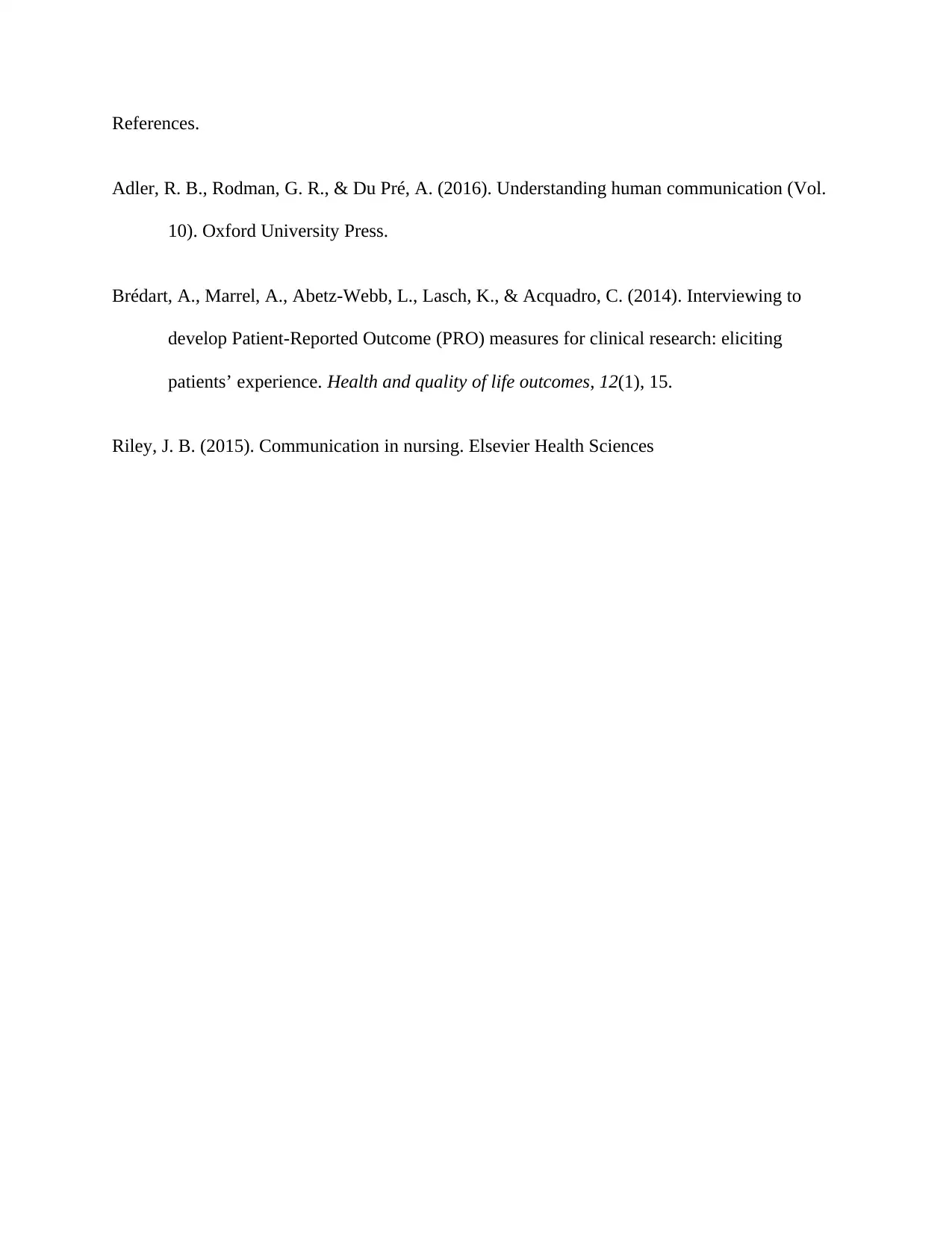Interview Summary: Insights on Aging and Communication Techniques
VerifiedAdded on 2022/11/07
|6
|1351
|231
Report
AI Summary
This report presents a student's interview with a 73-year-old, 'well' older adult, Mr. Rodrigues, conducted to gain first-hand information about aging and practice communication skills. The interview, conducted at Devonshire beach, Alberta, explored Mr. Rodrigues's perspective on aging, including the influences in his life, the impact of memory loss, and reflections on his experiences. The student utilized effective communication techniques, including open-ended questions and active listening, while considering therapeutic communication to support the respondent's well-being. The report highlights the significance of verbal and non-verbal expressions in achieving effective communication, referencing concepts like the 7 Cs of communication and cognitive theory. The interview revealed insights into the challenges and reflections of an older adult, emphasizing the importance of understanding and adapting to the aging process.

Students name;
Institutional affiliation;
Institutional affiliation;
Paraphrase This Document
Need a fresh take? Get an instant paraphrase of this document with our AI Paraphraser

An interview is a formal meeting in which both the interviewer and the interviewee communicate
through verbal and non-verbal expressions for effectiveness in communication and
understanding. The learner is interested in gaining first-hand information about aging from the
perspective of a "well" older adult. The other interest in this peace of an assignment is the use of
practical communication skills while the learner is interviewing the "well" older adult. This
interview summary of what the learner learned is, therefore written in a narrative format.
I found Mr Rodrigues a 73 year well older adult at 1100 hours at the Devonshire beach at Alberta
where he was relaxed enjoying the breeze alone. Mr Rodrigues is considered old due to the
change in the social role; retired, chronological age, and changes in functional abilities. I
approached the older adult for an interview. According to Adler, Rodman & Du Pré, (2016),
communication that can occur either verbally or non-verbally should lead to interaction and
connectedness between human beings while exchanging information. In as much as I aimed at
gaining important specific information from the older adult, I also focused on advancing the
physical and emotional well-being of the respondent. To make it effective, I respected the older
adult as my respondent; I made this possible by making the introduction as short as possible and
with clarity. I asked him about five questions to gain first-hand information about aging. I had
this in mind that after am dine with the interview, I should leave the older adult the way I found
him or more relaxed than how I saw him. I, therefore, considered making this communication
more therapeutic to support his feeling of well-being (Riley, 2015).
The "well" older adult Mr Rodrigues reported that the person who has been influencing his life
the most is Dr Norman Bethune. He stated that this man lived only 49 years (1890 -1939). Mr
Rodrigues described him as a brave human who was dedicated to both medicine and his political
course as well. He was a gifted surgeon whose main course was travelling the globe to help the
through verbal and non-verbal expressions for effectiveness in communication and
understanding. The learner is interested in gaining first-hand information about aging from the
perspective of a "well" older adult. The other interest in this peace of an assignment is the use of
practical communication skills while the learner is interviewing the "well" older adult. This
interview summary of what the learner learned is, therefore written in a narrative format.
I found Mr Rodrigues a 73 year well older adult at 1100 hours at the Devonshire beach at Alberta
where he was relaxed enjoying the breeze alone. Mr Rodrigues is considered old due to the
change in the social role; retired, chronological age, and changes in functional abilities. I
approached the older adult for an interview. According to Adler, Rodman & Du Pré, (2016),
communication that can occur either verbally or non-verbally should lead to interaction and
connectedness between human beings while exchanging information. In as much as I aimed at
gaining important specific information from the older adult, I also focused on advancing the
physical and emotional well-being of the respondent. To make it effective, I respected the older
adult as my respondent; I made this possible by making the introduction as short as possible and
with clarity. I asked him about five questions to gain first-hand information about aging. I had
this in mind that after am dine with the interview, I should leave the older adult the way I found
him or more relaxed than how I saw him. I, therefore, considered making this communication
more therapeutic to support his feeling of well-being (Riley, 2015).
The "well" older adult Mr Rodrigues reported that the person who has been influencing his life
the most is Dr Norman Bethune. He stated that this man lived only 49 years (1890 -1939). Mr
Rodrigues described him as a brave human who was dedicated to both medicine and his political
course as well. He was a gifted surgeon whose main course was travelling the globe to help the

injured communist partisans. Mr Rodrigues did this during the Spanish civil war in the year 1936
to the year 1939 and also during the year 1939 to 1945. The fact that he served his nation bravely
he remained a hero to his country and Mr Rodrigues as well. Mr Rodrigues used the first C of the
7 Cs considered ineffective communication where he delivered a piece of complete information
concerning the person he inspires him most. He talked of his achievements and the impact he has
made to the world and him individually as well. On the other hand, I, as the learner also
considered to listen effectively by paying attention to every detail concerning Mr Rodrigues’
hero. I did not interfere with his narration, and I ended up getting all that Mr Rodrigues had to
pass concerning Dr Norman.
Mr Rodrigues reported that mood changes and memory loss are the things that interfere most
with his daily activities. He said that he has no issue with his five senses, including hearing,
tasting, seeing, touching and smelling. He reported that significant interference is memory loss.
Memory loss keeps on interfering with his daily activities as he may spend a lot of time
neglecting other duties and argue with his wife. The argument could be that he has not eaten only
to find that he has forgotten he ate a couple of hours.
I felt relaxed, confident, and excited throughout the conversations when I asked about the first
question and the second question. Mr Rodrigues, therefore, became free and went ahead
speaking his mind. When I asked him the third question, He felt frustrated. It seemed that I was
bothering him. Moreover, the information I was enquiring had become more personal and
confidential. However, I applied the technique of cognitive theory. The theory focusses on how
people's thinking can change their feelings and behaviour. In as much as He was upset, I did not
give him a chance to alter my feelings too. I maintained my listening skills. He, therefore, ended
up reporting that he spent minimal time with his family as he spent most of the times in work as
to the year 1939 and also during the year 1939 to 1945. The fact that he served his nation bravely
he remained a hero to his country and Mr Rodrigues as well. Mr Rodrigues used the first C of the
7 Cs considered ineffective communication where he delivered a piece of complete information
concerning the person he inspires him most. He talked of his achievements and the impact he has
made to the world and him individually as well. On the other hand, I, as the learner also
considered to listen effectively by paying attention to every detail concerning Mr Rodrigues’
hero. I did not interfere with his narration, and I ended up getting all that Mr Rodrigues had to
pass concerning Dr Norman.
Mr Rodrigues reported that mood changes and memory loss are the things that interfere most
with his daily activities. He said that he has no issue with his five senses, including hearing,
tasting, seeing, touching and smelling. He reported that significant interference is memory loss.
Memory loss keeps on interfering with his daily activities as he may spend a lot of time
neglecting other duties and argue with his wife. The argument could be that he has not eaten only
to find that he has forgotten he ate a couple of hours.
I felt relaxed, confident, and excited throughout the conversations when I asked about the first
question and the second question. Mr Rodrigues, therefore, became free and went ahead
speaking his mind. When I asked him the third question, He felt frustrated. It seemed that I was
bothering him. Moreover, the information I was enquiring had become more personal and
confidential. However, I applied the technique of cognitive theory. The theory focusses on how
people's thinking can change their feelings and behaviour. In as much as He was upset, I did not
give him a chance to alter my feelings too. I maintained my listening skills. He, therefore, ended
up reporting that he spent minimal time with his family as he spent most of the times in work as
⊘ This is a preview!⊘
Do you want full access?
Subscribe today to unlock all pages.

Trusted by 1+ million students worldwide

a soldier after his hero. In as much his family lacked nothing in terms of basic needs, they ended
up requiring fatherly affectionate. He did this as he had lots of ambitions to achieve.
I asked the fourth question as an open-ended question. The open-ended question gave Mr
Rodrigues considerable freedom (Brédart et al., 2014). He, therefore, reported having learnt that
the cost of ambition is late nights, early mornings, being misunderstood by friends. Moreover,
people will want you to do good but not better than them. I tried to get clarity in his statement,
and I, therefore, asked him to restate the whole idea in different words. He kept silent for a while,
and when I asked him the last question, that’s when he reflected to explore the whole story and
the conversation. He then combined both the two queries and concluded. I maintained eye
contact for maximum concentration so that I may capture everything he is saying. He reported
that his favourite things, that he enjoyed doing most while young were the late nights and early
morning workouts while at work.
Besides, he reported that his happiest moments were when they won while at war, while the
saddest moments were the times when they lost the battles with their enemies. He explained with
bitterness to have worked all his lifetime diligently but never got promoted; the definition as to
people will like you to do good but not better than them. When I heard this, I ended up with a
statement “That’s hard to believe!”. This is merely responding to the distortion of reality by
expressing doubt. That was according to my beliefs, and I made Mr Rodrigues realize that other
people do not necessarily perceive events in the same way or draw the same conclusions. And he
saw some sense in it and chose to accept the situation the way it is.
In conclusion, verbal and non-verbal expressions are the main key things when it comes to
communication effectiveness. Verbal communication expressions involve the use of auditory
language for the passing of information from one person to the other, non-verbal expressions
up requiring fatherly affectionate. He did this as he had lots of ambitions to achieve.
I asked the fourth question as an open-ended question. The open-ended question gave Mr
Rodrigues considerable freedom (Brédart et al., 2014). He, therefore, reported having learnt that
the cost of ambition is late nights, early mornings, being misunderstood by friends. Moreover,
people will want you to do good but not better than them. I tried to get clarity in his statement,
and I, therefore, asked him to restate the whole idea in different words. He kept silent for a while,
and when I asked him the last question, that’s when he reflected to explore the whole story and
the conversation. He then combined both the two queries and concluded. I maintained eye
contact for maximum concentration so that I may capture everything he is saying. He reported
that his favourite things, that he enjoyed doing most while young were the late nights and early
morning workouts while at work.
Besides, he reported that his happiest moments were when they won while at war, while the
saddest moments were the times when they lost the battles with their enemies. He explained with
bitterness to have worked all his lifetime diligently but never got promoted; the definition as to
people will like you to do good but not better than them. When I heard this, I ended up with a
statement “That’s hard to believe!”. This is merely responding to the distortion of reality by
expressing doubt. That was according to my beliefs, and I made Mr Rodrigues realize that other
people do not necessarily perceive events in the same way or draw the same conclusions. And he
saw some sense in it and chose to accept the situation the way it is.
In conclusion, verbal and non-verbal expressions are the main key things when it comes to
communication effectiveness. Verbal communication expressions involve the use of auditory
language for the passing of information from one person to the other, non-verbal expressions
Paraphrase This Document
Need a fresh take? Get an instant paraphrase of this document with our AI Paraphraser

also called visual cues; involves passing of information without speaking. The essay has
incorporated the use of communication skills in order to end up with effective communication
between the interviewer and the interviewee during the entire period of the interview.
incorporated the use of communication skills in order to end up with effective communication
between the interviewer and the interviewee during the entire period of the interview.

References.
Adler, R. B., Rodman, G. R., & Du Pré, A. (2016). Understanding human communication (Vol.
10). Oxford University Press.
Brédart, A., Marrel, A., Abetz-Webb, L., Lasch, K., & Acquadro, C. (2014). Interviewing to
develop Patient-Reported Outcome (PRO) measures for clinical research: eliciting
patients’ experience. Health and quality of life outcomes, 12(1), 15.
Riley, J. B. (2015). Communication in nursing. Elsevier Health Sciences
Adler, R. B., Rodman, G. R., & Du Pré, A. (2016). Understanding human communication (Vol.
10). Oxford University Press.
Brédart, A., Marrel, A., Abetz-Webb, L., Lasch, K., & Acquadro, C. (2014). Interviewing to
develop Patient-Reported Outcome (PRO) measures for clinical research: eliciting
patients’ experience. Health and quality of life outcomes, 12(1), 15.
Riley, J. B. (2015). Communication in nursing. Elsevier Health Sciences
⊘ This is a preview!⊘
Do you want full access?
Subscribe today to unlock all pages.

Trusted by 1+ million students worldwide
1 out of 6
Related Documents
Your All-in-One AI-Powered Toolkit for Academic Success.
+13062052269
info@desklib.com
Available 24*7 on WhatsApp / Email
![[object Object]](/_next/static/media/star-bottom.7253800d.svg)
Unlock your academic potential
Copyright © 2020–2026 A2Z Services. All Rights Reserved. Developed and managed by ZUCOL.





